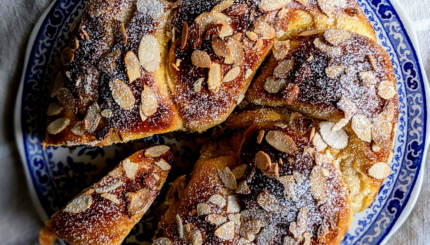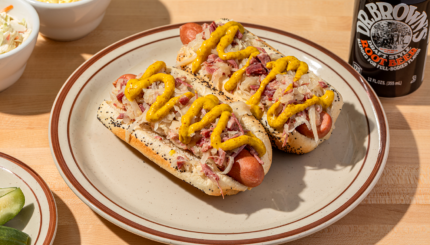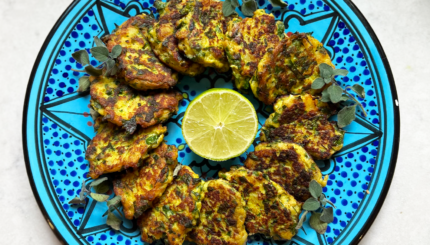This piece was originally published in the Forward. It is being republished here in honor of Yom HaShoah
I come from a family of people who hope.
I grew up with stories of how my grandparents and other family members who survived the Holocaust found strength, hope, and resilience in their moments of greatest despair. My grandfather, Saba Pista, recalled a day when he felt so weak from hunger and exhaustion in Buchenwald that he believed he could no longer go on. But then, he looked up from the quarry where he and others labored and locked eyes with a Nazi soldier on the bridge above. The soldier was unwrapping his sandwich for lunch and tossed half to my grandfather. My grandfather told me how sharing that moment of human connection gave him a rush of energy and hope: “I knew then that I would survive.”
My grandmother, Safta Eva, her sister Flora, and their cousin Katy also created reservoirs of hope. Together in the concentration camp barracks, they took turns reciting European novels and Shakespearean plays from memory to enliven their spirits during the long cold nights. Sadly, Flora and Katy didn’t survive, and Eva suffered from the heartbreak of losing her beloved sister and cousin for the rest of her life. Yet she always spoke of how she owed her life to them because they kept her hope alive.
Research has shown that descendants of Holocaust survivors carry elements of their parents’ or grandparents’ trauma epigenetically. Anxiety, fearfulness, and other traumatic effects are encoded in our genes. I think of how I practiced racing into my bedroom closet as a child and would sit huddled beneath my red snowsuit, praying the “Bad Men” wouldn’t find me there. Or how I lay awake at night straining my ears to hear their boots outside our front door.
At the same time, the day I first learned about the “Bad Men” who took my family away and tattooed blue numbers on their arms, I pledged to myself that I needed to do whatever I could to change the world so nothing like that would ever happen again. I carry my grandparents’ trauma within me, but thankfully I’ve always felt more deeply animated by faith that things can and will get better.
A friend once said to me, “It’s like you see a glass with a single drop in it and somehow you immediately are able to imagine that glass entirely full.” I’ve explained the persistence of my hopefulness as a deep-rooted sense that, after Auschwitz, things can only go up.
In her extraordinary biography, Harvey Milk: His Lives and Death, Lillian Faderman writes of how the Holocaust fueled Milk’s commitment to fight injustice as well as his belief that good would prevail. I believe that Harvey Milk, a gay Jew, inherited this legacy of hope much as I did. His own faith in the possibility of social change inspired others to hope as well. In one of his speeches, Harvey Milk famously said, “You have to give them hope. Hope for a better world. Hope for a better tomorrow… Hope that all will be alright.”
I know that I fill my well of hope not only with what I’ve inherited as the granddaughter of Holocaust survivors but also from the resilience of my queer ancestors such as Harvey Milk. I believe that in our work at Keshet with LGBTQ young people, we preserve Harvey’s legacy of hope. We often hear from queer teens and young adults who participate in Keshet Shabbaton retreats that getting to know Keshet’s staff fills them with hope for what is possible in their own futures. For the queer young people who live in socially conservative communities and feel particularly isolated, connecting with other queer Jews at a Shabbaton provides the most fundamental affirmation: you are not alone. You have a community. Together, our work will bring about a better future.
Our work can feel disheartening as we find ourselves fighting to protect hard-won rights that are under relentless attack by the current administration. Yet I see LGBTQ rights work as a fundamentally hopeful endeavor. We know that support for full equality is growing from generation to generation. So we will continue to fight to preserve our rights and advance LGBTQ justice until we achieve full rights and dignity for everyone.
As LGBTQ people and as Jews, we know how to resist, how to step up, how to survive and how to emerge from trauma with strength and resilience. In this time of uncertainty, it can be challenging to see clearly the contours of better days to come. It’s always grounding for me to talk with my 98-year-old grandmother, Safta Margo, another Holocaust survivor and my one remaining grandparent. No matter what life has thrown her way, she’s always maintained her good humor and hopefulness. She talks of how when she was in Auschwitz she found hope by repeating to herself her own grandfather’s words to her as a child: “God will take care of you.”
When I called Safta Margo a few days ago and asked her how she was doing in this time of increased fear and isolation, she reminded me of what she survived as a young woman. After Auschwitz, things can only go up. It is our responsibility to make it so.
Idit, her son, and her Safta Margo holding hands


